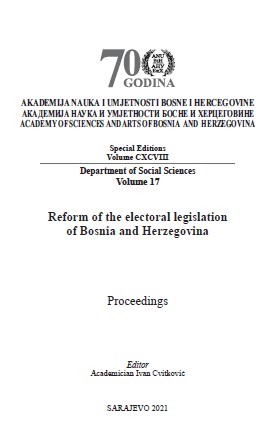Geneza izbornih procesa u Bosni i Hercegovini od 1996. do 2018. godine i moguće promjene u Ustavu i Izbornom zakonu
Genesis of Electoral Processes in Bosnia and Herzegovina from 1996 to 2018 and Possible Changes in the Constitution and Election Law
Author(s): Suad Arnautović
Subject(s): Constitutional Law, Political history, Government/Political systems, Electoral systems, Transformation Period (1990 - 2010), Present Times (2010 - today)
Published by: Akademija Nauka i Umjetnosti Bosne i Hercegovine
Keywords: electoralism; electoral system; party system; constituencies; ballot;
Summary/Abstract: We distinguish democratization from stable democracy. In the process of democratization that began in 1990, Bosnia and Herzegovina went through the stages of transition, replacement and displacement of the authoritarian, one-party system into a multi-party system, thus largely discontinuing the ideas (ideology), institutions and procedures of the former regime. However, we still cannot define Bosnia and Herzegovina as a “stable democracy”. What are the causes of this condition? It has been 30 years since the first multi-party elections in Bosnia and Herzegovina. It was the beginning of a process of transition from a one-party to a multi-party political system. From then until the end of 2018, eight presidential election cycles and simultaneous elections for national legislature were held. During that period, numerous political parties of different ideological directions, electoral support and organizational structure were created, but also disappeared from the political arena. Some political parties that were elected to the national parliament in 1990 were “legislative parties” even after the 2018 parliamentary elections, and many of them disappeared from the political arena in the meantime. The Bosnian electoral system has undergone several significant changes during the transition period. The proportional representation (PR) system for parliamentary elections was introduced in the 1990 elections. In the meantime, there have been structural changes in that system, in all the major elements of that system: (1) in the shaping of constituencies and their magnitude; (2) in the ballot type; (3) in a mathematical formula for transfer of votes into seats. Also, some properties of the majority system (FPTP) were changed for the presidential and mayoral elections? These “technical” changes in the electoral system, while maintaining the outdated exclusive ethno-territorial political representation, reduce the electoral processes in BiH to mere electoralism. Is there an alternative to such a situation? Those are the fundamental questions that I set out to answer in this paper.
Book: Reforma izbornog zakonodavstva Bosne i Hercegovine
- Page Range: 48-79
- Page Count: 32
- Publication Year: 2021
- Language: Bosnian, Croatian, Serbian
- Content File-PDF

